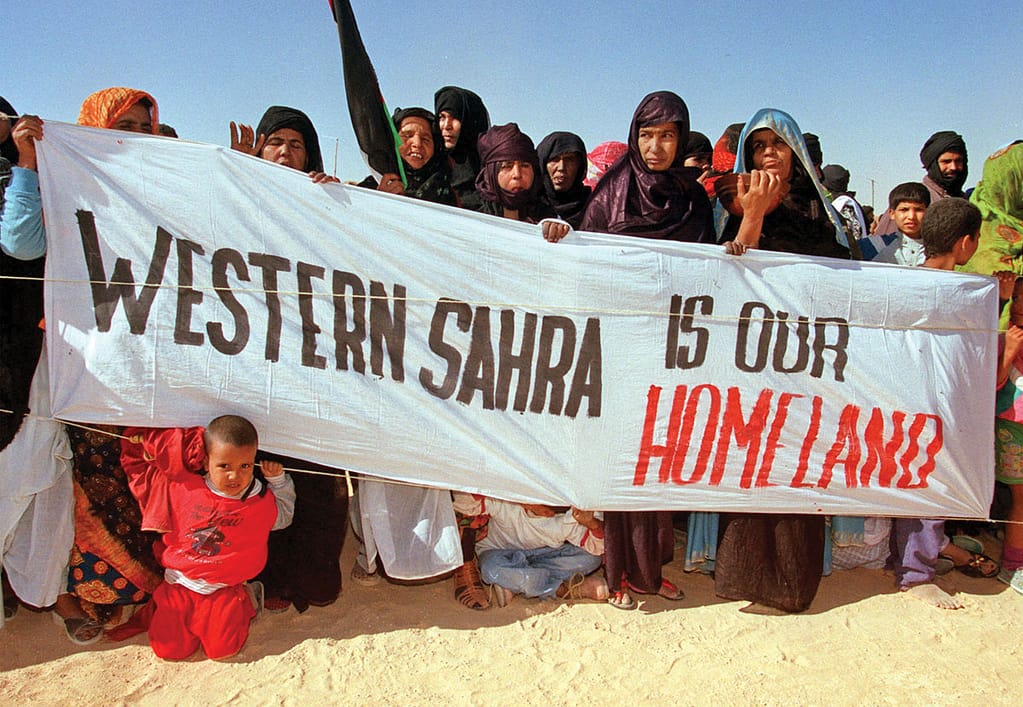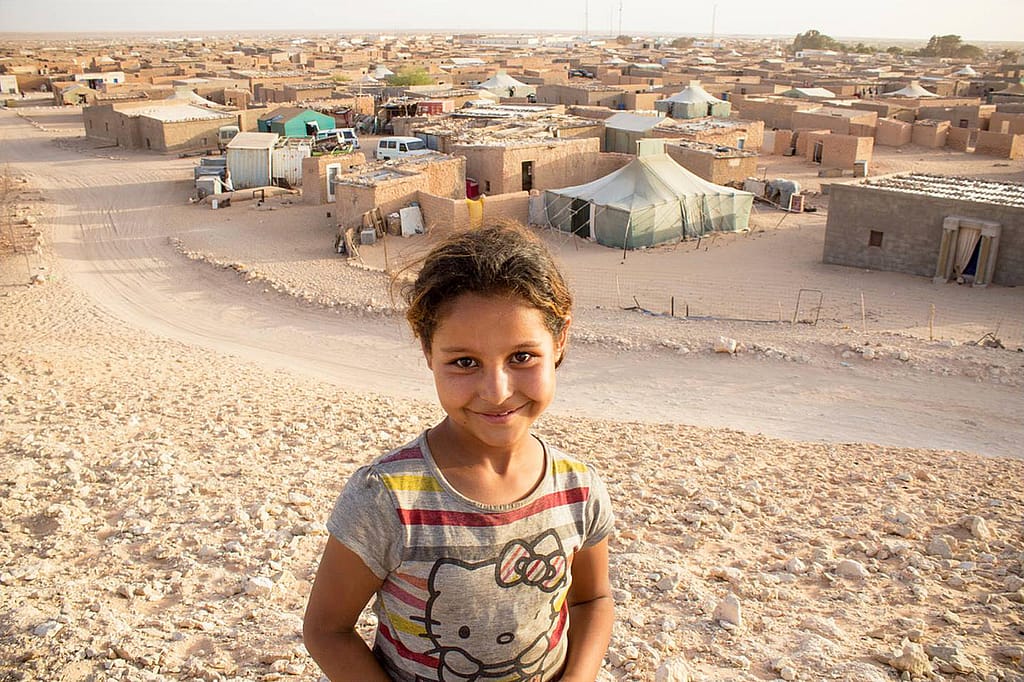Western Sahara, a region in North Africa bordered by Morocco, Algeria, and Mauritania, has long been a site of geopolitical complexity, marked by a protracted struggle for self-determination and human rights by its indigenous people, the Sahrawis. The history of this territory is intricate, entwined with colonial legacies, geopolitical interests, and the quest for independence. This blog will discuss an in depth review of the occupation of Western Sahara.

Historical Background
Prior to European colonization, the Sahrawis were nomadic people with a rich cultural heritage, residing in the region for centuries. However, in the late 19th and early 20th centuries, European powers began to exert control over the area. Spain claimed sovereignty over the Western Sahara region in the late 19th century, establishing it as a Spanish colony.
Colonial Rule and the Rise of Sahrawi Nationalism
Under Spanish rule, resentment brewed among the Sahrawis due to economic exploitation and cultural marginalization. In response, Sahrawi nationalism emerged, advocating for self-governance and the preservation of their cultural identity. The Polisario Front, formed in 1973, became the vanguard of this movement, seeking independence from Spanish colonialism.
The Green March and Moroccan Annexation
In 1975, Spain announced its intention to decolonize the region. This led to the infamous Madrid Accords, where Spain, Morocco, and Mauritania negotiated the fate of Western Sahara without the consultation of the indigenous Sahrawi population. The Green March, orchestrated by Morocco, saw thousands of Moroccan civilians marching into Western Sahara, pressuring Spain to cede control. In the aftermath, Morocco annexed much of the territory, while Mauritania claimed a smaller portion.
Conflict and Human Rights Abuses
The Polisario Front fiercely opposed the annexation, sparking a decades-long armed conflict with Morocco. In 1991, a ceasefire was brokered under the auspices of the United Nations, with the promise of a referendum to determine the region’s fate. However, this plebiscite never materialized, leaving the Sahrawis in a state of protracted limbo.
Throughout this period, reports of human rights abuses surfaced, including forced disappearances, arbitrary arrests, and suppression of cultural expression. The presence of a heavily fortified Moroccan military in the occupied territories has led to ongoing repression and violations of basic human rights.

Human Right Abuses
1. Suppression of Dissent: Any form of dissent against Moroccan rule in Western Sahara is met with severe consequences. Peaceful protests advocating for self-determination or criticizing Moroccan policies often lead to arrests, harassment, and even violent crackdowns by security forces.
2. Arbitrary Arrests and Detentions: Sahrawis, including activists and journalists, face arbitrary arrests and prolonged detention without fair trials. Many have been held incommunicado, sometimes subjected to torture and ill-treatment during interrogation.
3. Restrictions on Freedom of Expression: There are significant limitations on freedom of expression, assembly, and association. Independent media outlets advocating for Sahrawi rights are heavily censored, and journalists face intimidation, harassment, and imprisonment.
4. Disproportionate Use of Force: Security forces have been accused of using excessive force against peaceful demonstrators, resulting in injuries and even fatalities. The use of tear gas, rubber bullets, and other crowd-control measures has been reported in instances where Sahrawis peacefully express their dissent.
5. Discrimination and Marginalization: Sahrawis living under Moroccan control often face discrimination in access to education, employment, and public services. Their cultural and linguistic rights are frequently disregarded, contributing to a sense of marginalization within their own homeland.
6. Violations in Occupied Territories: The presence of a large Moroccan military force in the occupied territories of Western Sahara has led to reports of violations such as confiscation of property, restrictions on movement, and lack of accountability for abuses committed by security forces.
7. Limited Access to Justice: The justice system in Western Sahara lacks impartiality and transparency, especially concerning cases involving Sahrawis. Victims of human rights abuses often find it challenging to seek justice due to systemic biases.
8. Restrictions on Movement: Sahrawis often encounter limitations on their freedom of movement within their own territory. Checkpoints and barriers impede travel between regions, affecting daily life, trade, and access to essential services.
9. Socio-Economic Discrimination: Sahrawis frequently experience economic discrimination, hindering their access to employment opportunities and economic resources. They face systemic barriers that limit their economic participation and development.
10. Cultural Erosion: The Sahrawi cultural identity faces erosion under Moroccan rule. Efforts to preserve and promote Sahrawi language, traditions, and heritage are suppressed or marginalized, contributing to a loss of cultural autonomy.
11. Exploitation of Natural Resources: Western Sahara is rich in natural resources, including fisheries, phosphates, and potentially lucrative mineral deposits. However, Sahrawis have little control over the exploitation and management of these resources, with profits often benefiting external entities or Moroccan interests rather than the local population.
12. Impunity for Human Rights Violations: Cases of human rights abuses against Sahrawis often go unpunished. There’s a lack of accountability for security forces and individuals responsible for human rights violations, perpetuating a cycle of impunity.
13. Right to Return: Sahrawi refugees living in camps in Algeria face challenges in exercising their right to return to their homeland. The conditions and lack of a viable political resolution to the conflict hinder their ability to return to Western Sahara with dignity and safety.
14. Access to Education and Healthcare: While efforts exist to provide education and healthcare, Sahrawis in occupied territories face disparities in access compared to other regions under Moroccan governance. Limited educational opportunities and healthcare facilities hinder their well-being and development.
International Response and Stalemate
The international community has grappled with the Western Sahara conflict, with various UN resolutions urging for a peaceful resolution and the exercise of self-determination by the Sahrawi people. Efforts by the UN and other mediators to facilitate talks between Morocco and the Polisario Front have often reached an impasse due to diverging stances on the referendum’s terms and conditions.
Sahrawi Refugee Crisis and Resilience
Amidst the conflict, a significant portion of the Sahrawi population fled to neighboring Algeria, where refugee camps like Tindouf were established. These camps, home to thousands of Sahrawi refugees, have persisted for decades, grappling with issues of limited resources, economic hardship, and a sense of displacement.
Despite adversity, the Sahrawi people have demonstrated resilience, maintaining their cultural heritage and fostering a sense of community within the camps. Educational initiatives, cultural programs, and advocacy efforts for human rights and self-determination continue within these makeshift settlements.

Current Status and Hopes for Resolution
As of the present day, the situation remains unresolved, with Western Sahara effectively split between Moroccan control and areas administered by the Polisario Front. The quest for a just and lasting solution remains elusive, as geopolitical complexities and divergent interests persist.
Conclusion of the Occupation of Western Sahara
The history of Western Sahara and the plight of the Sahrawis reflect a struggle for self-determination, marked by a quest for justice and respect for human rights. The unresolved conflict underscores the importance of addressing historical injustices, ensuring the right to self-determination, and upholding the fundamental rights of the Sahrawi people. The international community’s commitment to finding a peaceful and just resolution remains crucial in bringing an end to the protracted suffering endured by the Sahrawis and achieving a lasting peace in the region.
